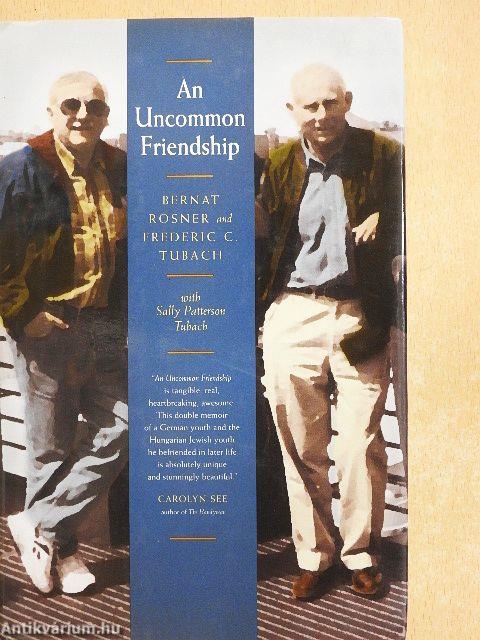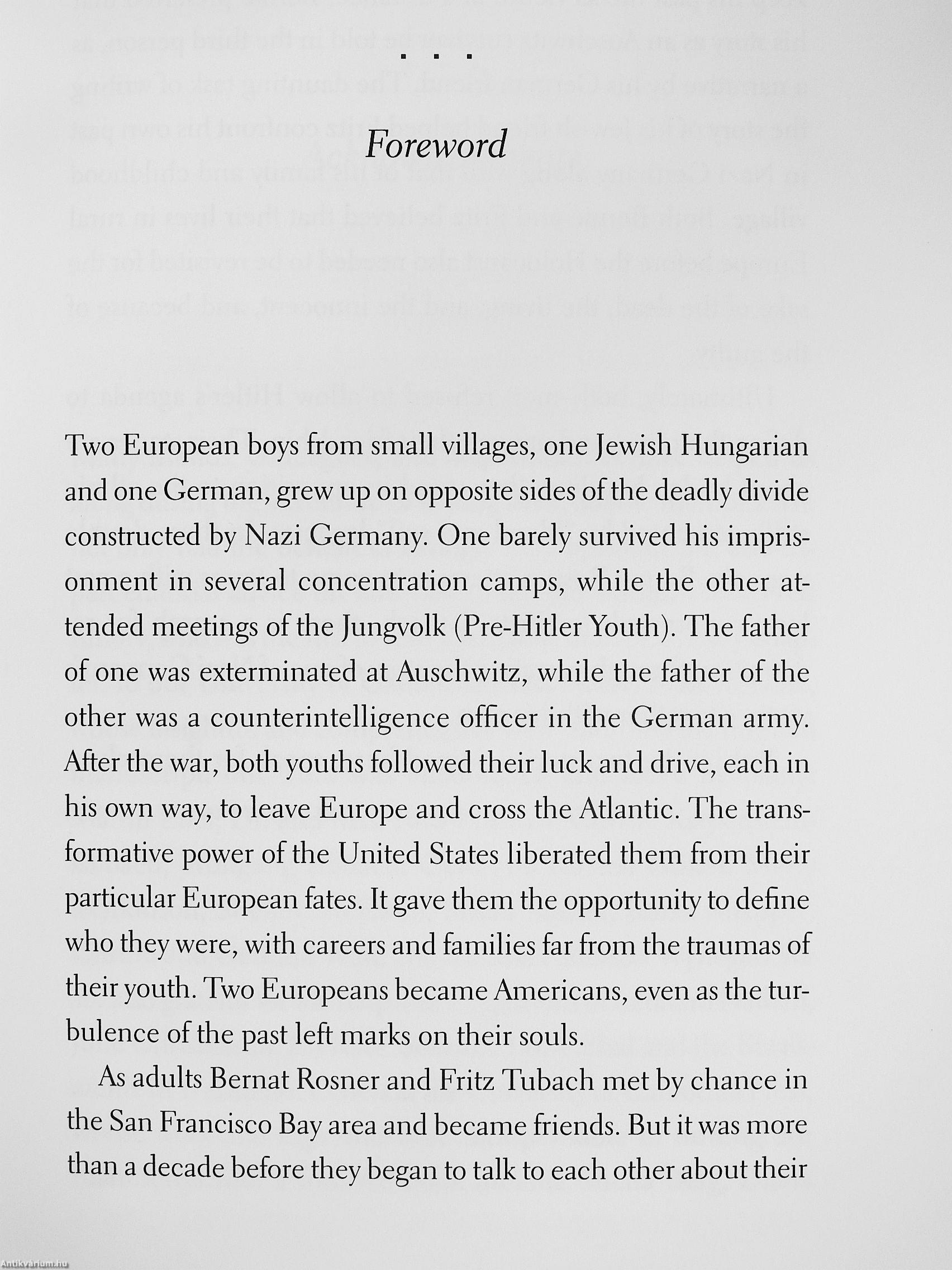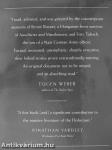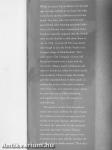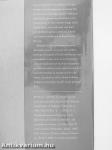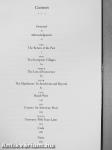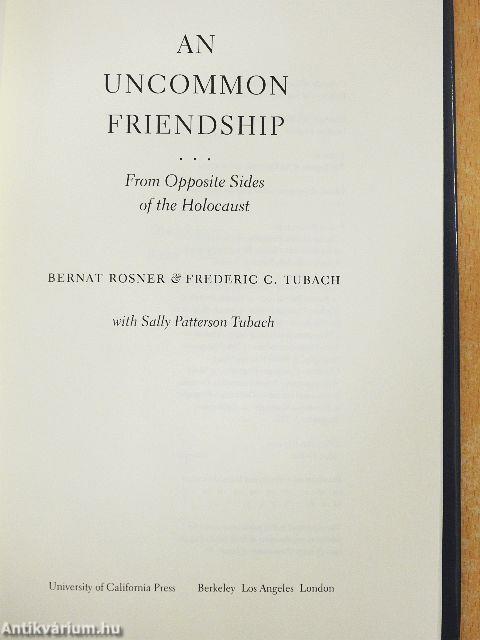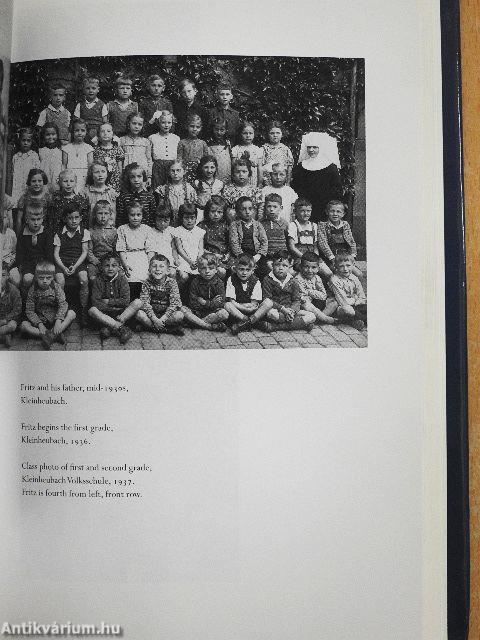1.103.837
kiadvánnyal nyújtjuk Magyarország legnagyobb antikvár könyv-kínálatát

VISSZA
A TETEJÉRE
JAVASLATOKÉszre-
vételek
An Uncommon Friendship
From Opposite Sides of the Holocaust
| Kiadó: | University of California Press |
|---|---|
| Kiadás helye: | Berkeley |
| Kiadás éve: | |
| Kötés típusa: | Félvászon |
| Oldalszám: | 271 oldal |
| Sorozatcím: | |
| Kötetszám: | |
| Nyelv: | Angol |
| Méret: | 22 cm x 14 cm |
| ISBN: | 0-520-22531-7 |
| Megjegyzés: | Fekete-fehér fotókkal. |
naponta értesítjük a beérkező friss
kiadványokról
naponta értesítjük a beérkező friss
kiadványokról
Előszó
TovábbFülszöveg
"I read, admired, and was gripped by the counterpoint memoirs of Bernie Rosner, a Hungarian-born survivor of Auschwitz and Mauthausen, and Fritz Tubach,
the son of a Nazi German Army officer. Factual, measured, unemphatic, sharply evocative, their linked stories prove extraordinarily moving. An original document not to be missed, and an absorbing read."
EUGEN WEBER
author of The Hollow Years
A fine book [and] a significant contribution to the massive literature of the Holocaust."
JONATHAN YARDLEY,
Wnshin0on Posl Book World
What we don't know about our friends may one day explode in our faces, but what we do know can be a different sort of time bomb. Two men, who meet and become good friends after enjoying successful adult lives in California, have experienced childhoods so tragically opposed that the friends must decide whether to talk about them or not. In 1944, 13-year-old Fritz was almost old enough to join the Hitler Youth in his German village of Kleinheubach. That... Tovább
Fülszöveg
"I read, admired, and was gripped by the counterpoint memoirs of Bernie Rosner, a Hungarian-born survivor of Auschwitz and Mauthausen, and Fritz Tubach,
the son of a Nazi German Army officer. Factual, measured, unemphatic, sharply evocative, their linked stories prove extraordinarily moving. An original document not to be missed, and an absorbing read."
EUGEN WEBER
author of The Hollow Years
A fine book [and] a significant contribution to the massive literature of the Holocaust."
JONATHAN YARDLEY,
Wnshin0on Posl Book World
What we don't know about our friends may one day explode in our faces, but what we do know can be a different sort of time bomb. Two men, who meet and become good friends after enjoying successful adult lives in California, have experienced childhoods so tragically opposed that the friends must decide whether to talk about them or not. In 1944, 13-year-old Fritz was almost old enough to join the Hitler Youth in his German village of Kleinheubach. That same year in Tab, Hungary, 12-year-old Bernie was loaded onto a train with the rest of the village's Jewish inhabitants and taken to Auschwitz, where his whole family was murdered. How to bridge the deadly gulf that separated them in their youth, to remove the power of the past to separate them even now, as it separates many others, becomes the focus of their friendship, and together they begin the project of remembering.
The separate stories of their youth are told in one voice, at Bernat Rosner's request. He is able to retrace his journey into hell, slowly, over many sessions, describing for his friend the "other life" he has resolutely put away until then. Frederic Tubach, who must confront his own years in Nazi Germany as the story unfolds, becomes the narrator of their double memoir. Their deci-
sión to open their friendship to the past brings a special poignancy to stories that are alf too horrifyingly familiar. Adding a further and fascinating dimension is the counterpoint of their similar village childhoods before the Holocaust and their very different paths to personal rebirth and creative adulthood in America after
Seldom has a memoir been so much about the present, as we see the authors proving what good will and intelligence can accomplish in the cause of reconciliation. This intimate story of two boys trapped in evil and destructive times, who become men with the freedom to construct their own future, has much to tell us about building bridges in our public as well as our personal
BERNAT ROSNER retired from his position as general counsel of the Safeway Corporation in Oakland, California, in 1993. FREDERIC C. TUBACH is Professor Emeritus of German at the University of California, Berkeley, and co-author of Germany, 2000 Years, Vol. Ill (with Gerhart Hoffmeister, 2d ed., 1992). Sally Patterson Tubach, author of Memoirs oja Terrorist (1996), is a writer and editor.
Jacket design: Barbara Jellow Vissza
Témakörök
- Idegennyelv > Idegennyelvű könyvek > Angol > Szépirodalom > Megtörtént bűnügyek, dokumentumregények
- Idegennyelv > Idegennyelvű könyvek > Angol > Szépirodalom > Regény, novella, elbeszélés
- Idegennyelv > Idegennyelvű könyvek > Angol > Történelem > Európa története > Magyarország története
- Idegennyelv > Idegennyelvű könyvek > Angol > Történelem > Európa története > Egyéb
- Szépirodalom > Regény, novella, elbeszélés > Tartalom szerint > Történelmi regények > Koncentrációs táborok, holokauszt
- Történelem > Idegennyelvű > Angol
- Történelem > Magyarország története és személyiségei > Magyarország a XX. században > II. világháború > Holokauszt
- Történelem > Kontinensek szerint > Európa, európai országok története > Nyugat-Európa > Németország
- Történelem > Legújabb kor > II. világháború > Holokauszt
- Szépirodalom > Regény, novella, elbeszélés > Tartalom szerint > Életrajzi regények > Önéletrajzok, naplók, memoárok
- Szépirodalom > Megtörtént bűnügyek, dokumentumregények



